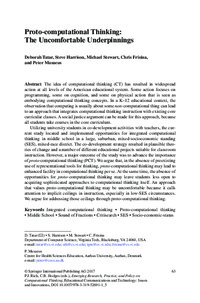Proto-computational ThinkingThe Uncomfortable Underpinnings
Deborah Tatar, Steve Harrison, Michael Stewart, Chris Frisina, Peter Musaeus
Zu finden in: Emerging Research, Practice, and Policy on Computational Thinking (Seite 63 bis 81), 2017
  |
 |
 Zusammenfassungen
Zusammenfassungen

The idea of computational thinking (CT) has resulted in widespread action at all levels of the American educational system. Some action focuses on programming, some on cognition, and some on physical action that is seen as embodying computational thinking concepts. In a K-12 educational context, the observation that computing is usually about some non-computational thing can lead to an approach that integrates computational thinking instruction with existing core curricular classes. A social justice argument can be made for this approach, because all students take courses in the core curriculum.
Utilizing university students in co-development activities with teachers, the current study located and implemented opportunities for integrated computational thinking in middle school in a large, suburban, mixed-socioeconomic standing (SES), mixed-race district. The co-development strategy resulted in plausible theories of change and a number of different educational projects suitable for classroom instruction. However, a major outcome of the study was to advance the importance of proto-computational thinking (PCT). We argue that, in the absence of preexisting use of representational tools for thinking, proto-computational thinking may lead to enhanced facility in computational thinking per se. At the same time, the absence of opportunities for proto-computational thinking may leave students less open to acquiring sophisticated approaches to computational thinking itself. An approach that values proto-computational thinking may be uncomfortable because it calls attention to implicit ceilings in instruction, especially in low-SES circumstances. We argue for addressing those ceilings through proto-computational thinking.
 Dieses Kapitel erwähnt ...
Dieses Kapitel erwähnt ...
 Personen KB IB clear | Henry Becker , Karen Brennan , Ann L. Brown , Evelyn Eastmond , Terry Harvey , Andri Ioannidou , Yasmin B. Kafai , John Maloney , Amon Millner , Andrés Monroy-Hernández , Lori L. Pollock , Alexander Repenning , Mitchel Resnick , Eric Rosenbaum , Natalie Rusk , Jay Silver , Brian Silverman , David Webb | ||||||||||||||||||||||||||||||||||||||||||||||||||||||
 Begriffe KB IB clear | AgentCubes , AgentSheets , computational thinkingcomputational thinking , theory of change | ||||||||||||||||||||||||||||||||||||||||||||||||||||||
 Bücher |
| ||||||||||||||||||||||||||||||||||||||||||||||||||||||
 Texte |
|
 Tagcloud
Tagcloud
 Zitationsgraph
Zitationsgraph
 Zitationsgraph (Beta-Test mit vis.js)
Zitationsgraph (Beta-Test mit vis.js)
 Anderswo finden
Anderswo finden
 Volltext dieses Dokuments
Volltext dieses Dokuments
 |  Proto-computational Thinking: The Uncomfortable Underpinnings: Artikel als Volltext bei Springerlink ( Proto-computational Thinking: The Uncomfortable Underpinnings: Artikel als Volltext bei Springerlink ( : :  , 574 kByte; , 574 kByte;  : :  ) ) |
 Anderswo suchen
Anderswo suchen 
 Beat und dieses Kapitel
Beat und dieses Kapitel
Beat hat Dieses Kapitel während seiner Zeit am Institut für Medien und Schule (IMS) ins Biblionetz aufgenommen. Beat besitzt kein physisches, aber ein digitales Exemplar. Eine digitale Version ist auf dem Internet verfügbar (s.o.). Es gibt bisher nur wenige Objekte im Biblionetz, die dieses Werk zitieren.













 Biblionetz-History
Biblionetz-History